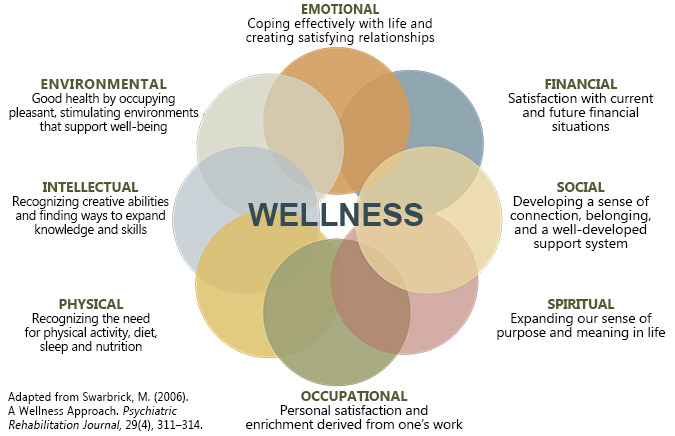|
An accident or change in health status can be a very jarring event in one’s life. Daily routines can change quite rapidly, and there is often concern of lost independence and sense of self.  Individuals who are able to receive medical and therapeutic intervention following an accident or change in health status may dwell on many different thoughts..
Therapy soon after hospitalization helps directly and indirectly address many of these concerns, but underlying the process of recovery is improving one’s overall wellness. So, what is wellness? The Global Wellness Institute defines the concept as “...the active pursuit of activities, choices and lifestyles that lead to a state of holistic health”. There are two important points to this definition. One is that wellness requires action - intentional choices that are made to support gains in health. The other point is that wellness is holistic - it encompasses many different factors, not just your physical health. In fact, wellness consists of a minimum of 6 different dimensions, including:
Thus, addressing one’s wellness has many different pathways which can influence overall lifestyle. Given the need for significant lifestyle changes along the road to rehabilitation after diagnosis of a stroke, traumatic brain injury, or other acquired neurological conditions, incorporating wellness management into a therapeutic routine can improve how you feel, think, move, and interact in day-to-day routines. Here are some considerations to keep in mind as you start to build a wellness regimen:
I challenge you to pick one dimension of wellness to focus on this month. Think about your baseline (where you are starting), your goal (where you want to end), and practical steps (what it will take to get from your baseline to your goal). How will you manage your wellness? References: Cancer.Net: Brain Tumor Risk Factors Effect of Exercise Training or Complex Mental and Social Activities on Cognitive Function in Adults With Chronic Stroke How Exercise Protects Your Brain’s Health Improved Cognitive Performance Following Aerobic Exercise Training in People with Traumatic Brain Injury Mayo Clinic: Traumatic Brain Injury Physical Activity and Exercise Recommendations for Stroke Survivor Stroke Association: Getting active after a stroke Stroke Association: Healthy eating and stroke Stroke Association: How to reduce your risk of stroke guide The benefits of exercise for outcome improvement following traumatic brain injury: Evidence, pitfalls and future perspectives The Eight Dimensions of Wellness The Global Wellness Institute: What is Wellness? The Potential Role of Exercise in Neuro-Oncology
0 Comments
Your comment will be posted after it is approved.
Leave a Reply. |
Devon Brunson, MS, CCC-SLP, CBISWelcome to the CSL Blog - musings about treatment, education, care, and advocacy. Archives
June 2024
Categories |

 RSS Feed
RSS Feed